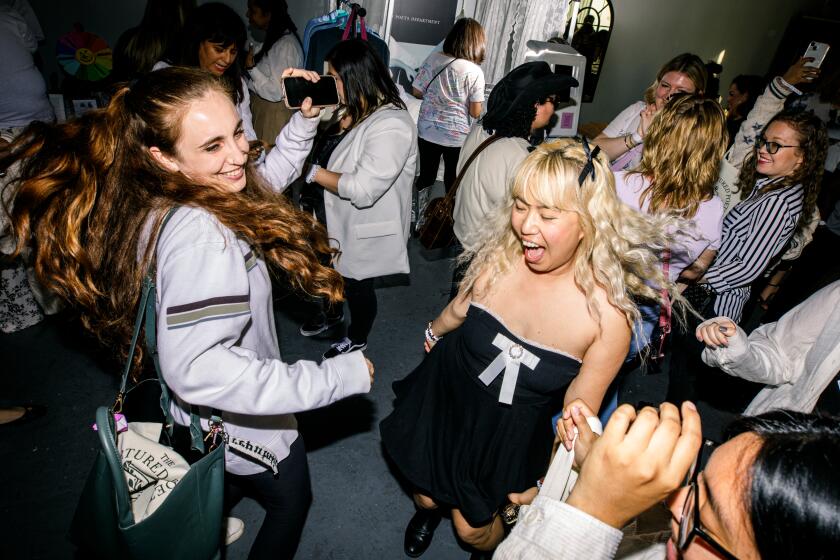British punk duo Sleaford Mods discuss simple beats and hardened tirades in advance of their Los Angeles debut
It’s tempting to refer to Jason Williamson, the lyricist and founder of Sleaford Mods, as the duo’s singer, except that the Brit with the grim face doesn’t hit notes so much as deliver tirades, unfurling his songs with unwavering linearity.
He packs so much verbiage into his verses and choruses that he could be considered a rapper, except Williamson, who is white and defiantly British, is unconcerned with dope beats, heavy bass and weird bridges.
“It’s all about compression, so we veered away from that,” Williamson says of contemporary music during a recent phone conversation from New York. “That kind of stuff is just too loud. It kills it. So we recorded stuff how it used to sound. It’s quieter, but there’s something menacing about that, I think.”
In the background, the clinking of glasses and chatter suggest he’s speaking from a pub.
The acclaimed band will make its Los Angeles debut at the Echoplex in Echo Park on Sunday, the latest stop on a run of successes that for years seemed unlikely. Williamson has been trying to make it as a musician for more than two decades; he’s finally succeeded using a brutalist formula that’s part poetry and part punk rock.
Using an epithet to describe the Nottingham music scene in the late 1990s, Williamson says that making a go of it outside of London and Manchester “was pointless.”
“It wasn’t commercially viable,” he says, “and that kind of music in the city was dead, to be honest. But I knew that it was good, and I knew that anybody worth their weight in gold would pick up on it.”
That confidence is apparent across Sleaford Mods’ 10th studio album, “English Tapas.” The screamer and the music — simple electronic beats produced by member Andrew Fearn — revel in repetition, moving in tandem like a locomotive and caboose on a downhill slope.
Asked about the rhythmic monotony of many Mods songs, Williams replies that he and Fearn prefer minimalism. A complicated beat, he says, “just crowds it up,” whereas his goal is getting the message across.
“Let’s go back to corridors of mine and also yours/ Where the dust lays on the shelf in this the quiet hell,” Williamson utters to open “Time Sands,” running on about “cigarettes and trains and plastic and bad brains” while describing someone waking on the streets during morning rush hour after an overnight bender.
On “Just Like We Do,” Williamson takes aim at nostalgic old punk rockers: “I don’t give a ... what you did back in the day/ What you’re doin’ now is useless/ You just drink too much, mate.”
He tackles Brexit voters who chose to abandon the European Union, homing in on right-wing politician Boris Johnson in “Moptop.” On “Snout,” Williamson lashes out with extreme language against social media stars: “Do you wanna know where that man is from? He’s on Snapchat, you ...”
Taken as a whole, Williamson’s work documents East Midlands working-class England with the specificity of William Faulkner’s Yoknapatawpha County, Miss. He sings about supermarket closures and English theme parks, of “tellies in pubs” and English comedian Bernie Winters and his St. Bernard.
Asked whether he worries that American audiences might miss his references, Williamson replies that it doesn’t matter. He’s never ignored good music because of obscure lyrics.
“What I liked was the way that the vocal was done and the way that the music was done,” he says. “And I think that how we do the vocal and the music will appeal to a lot of people regardless of the lyrical content.”
Williams added: “If anything, it’s new fodder for peoples’ ears, isn’t it?”
For tips, records, snapshots and stories on Los Angeles music culture, follow Randall Roberts on Twitter and Instagram: @liledit. Email: randall.roberts@latimes.com.
More to Read
The biggest entertainment stories
Get our big stories about Hollywood, film, television, music, arts, culture and more right in your inbox as soon as they publish.
You may occasionally receive promotional content from the Los Angeles Times.







